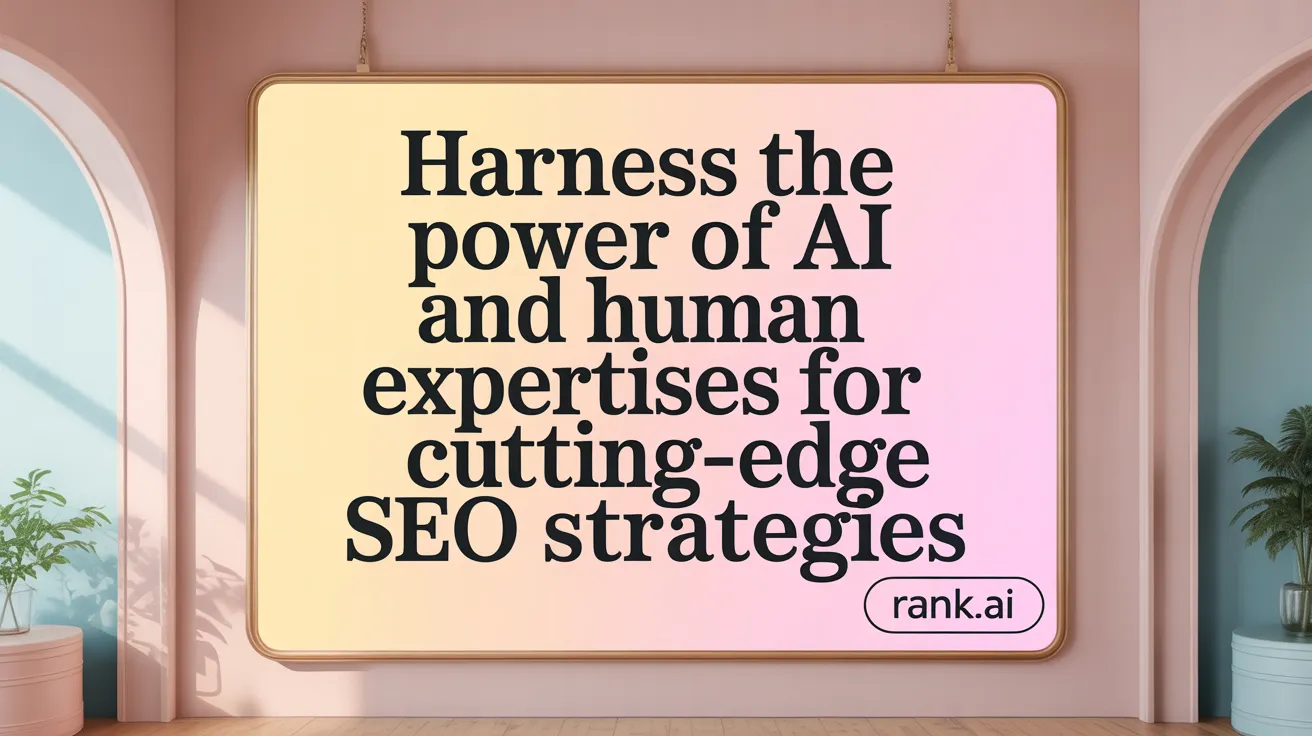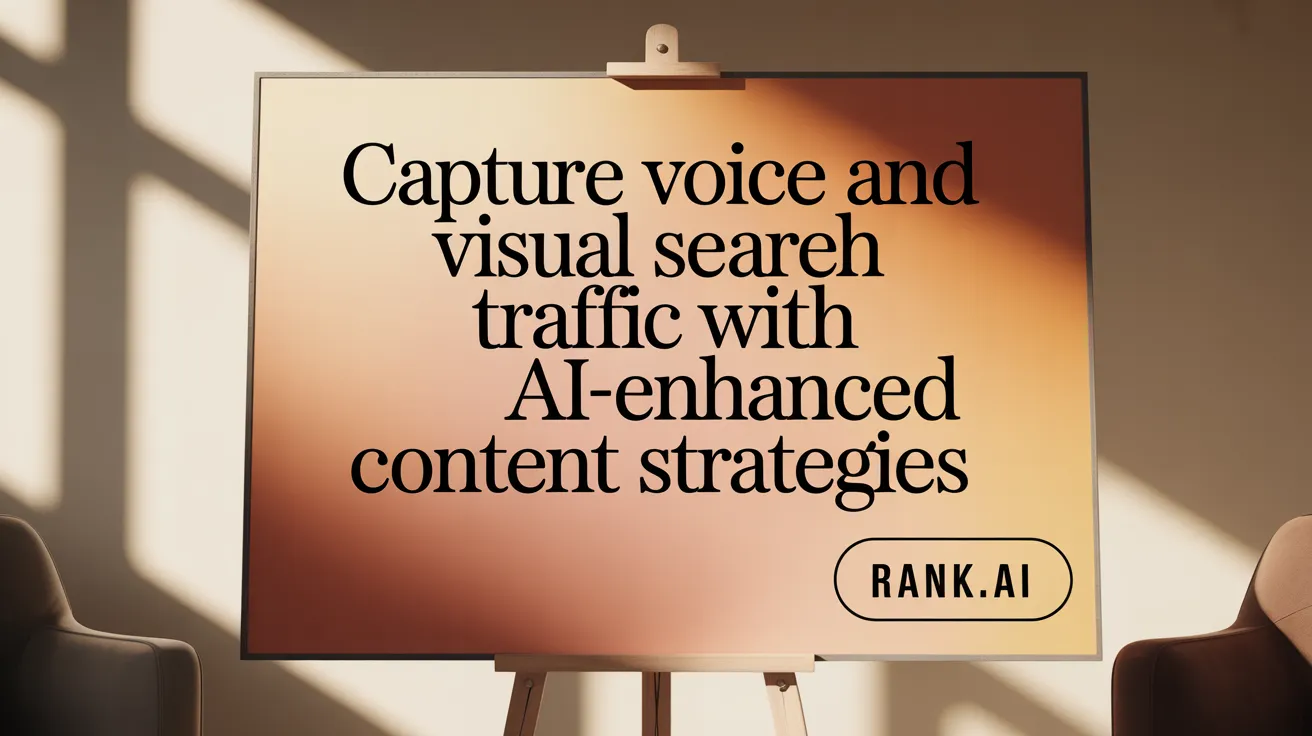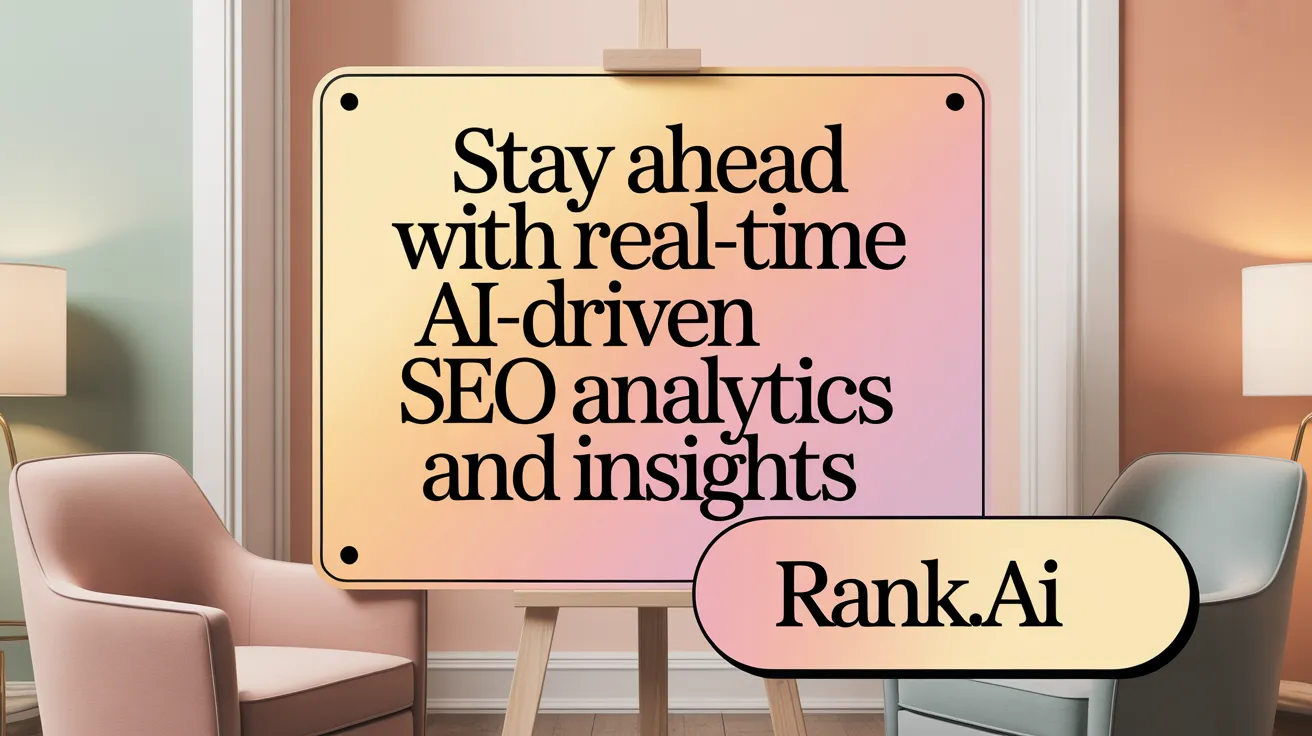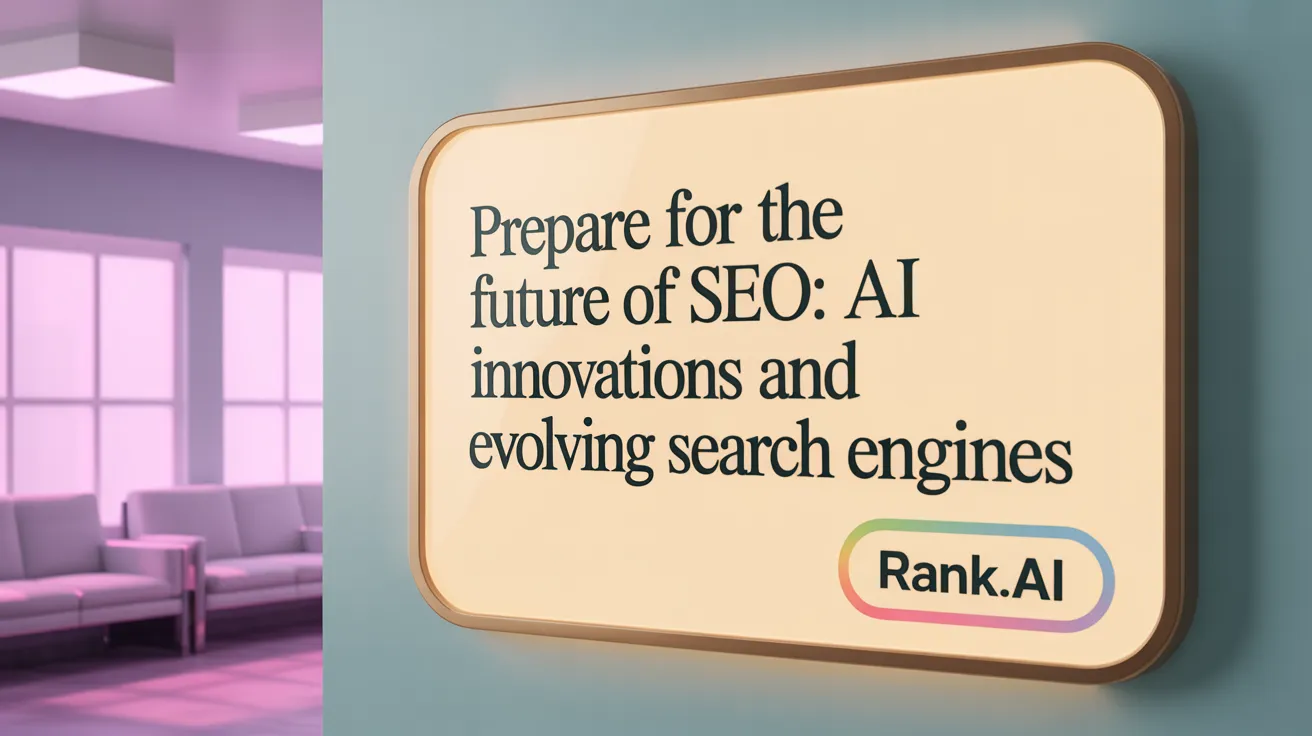AI-Driven SEO Strategies That Will Skyrocket Your Rankings
Revolutionize Your Search Rankings with AI-Powered SEO Techniques

Introduction to AI-Driven SEO
Artificial Intelligence (AI) is transforming search engine optimization (SEO), merging cutting-edge data analysis with traditional tactics to elevate online visibility. Businesses leveraging AI-enhanced SEO strategies gain a competitive edge by automating keyword research, content generation, and link building while mastering new challenges posed by AI-driven search platforms. This article explores AI-driven SEO strategies that will skyrocket your site rankings, integrating insights from top AI-powered platforms like Rank.ai alongside proven techniques and future trends.
Understanding Rank.ai: AI-Powered SEO Meets Digital Marketing
What is Rank.ai and what services does it provide?
Rank.ai is a sophisticated AI-powered SEO platform combined with a digital marketing agency. It focuses on enhancing a business's online visibility and improving search engine rankings through intelligent automation and data-driven SEO strategies. The platform offers a suite of services including automated content creation, real-time SEO scoring, semantic SEO analysis, and integration with tools like Google Search Console. Beyond traditional SEO, Rank.ai utilizes AI video generation technologies such as Synthesia, enabling the production of personalized marketing and training videos with diverse avatars and multiple language options. This multimedia approach helps brands maintain consistency and engagement globally, making SEO efforts more dynamic and comprehensive.
Types of businesses that can benefit from Rank.ai
Rank.ai's AI-driven SEO solutions are designed to accommodate a wide range of business sizes and industries — from startups and freelancers to mid-sized companies and large enterprises. Its offerings support diverse SEO needs including keyword research, site audits, content optimization, and adaptation for voice and multimedia searches. By leveraging AI to analyze search intent and identify competitive gaps, Rank.ai empowers content creators with efficient, SEO-friendly tools that streamline workflows and prioritize impactful SEO strategies. This makes it a flexible choice for businesses aiming to boost their digital presence, attract targeted traffic, and generate higher-quality leads through scalable and personalized SEO strategies.
Integrating AI With Traditional SEO: Rank.ai’s Strategic Approach

How does Rank.ai integrate AI technology with traditional SEO methods?
Rank.ai expertly combines AI-powered SEO automation with time-tested SEO strategies to boost online visibility. The platform automates tasks like content generation, keyword research, and insightful data analysis, significantly speeding up processes that traditionally demanded extensive human effort. Alongside this automation, Rank.ai integrates foundational SEO elements such as schema markup, ensuring search engines better understand page content, and emphasizes content depth and trust signals to build authority.
Importance of human oversight alongside AI automation
Despite powerful AI automation, Rank.ai stresses the necessity of human input. Human oversight safeguards the accuracy and relevance of AI-driven outputs by verifying facts, refining content tone, and aligning with E-E-A-T (Experience, Expertise, Authoritativeness, Trustworthiness) standards. This balanced fusion helps avoid pitfalls like AI hallucinations or generic content, thus maintaining the integrity and credibility of a website's SEO performance.
Shifts in SEO strategies due to AI-powered search results
The rise of AI search engines—offering direct, generative answers—has shifted SEO focus from traditional keyword stuffing to strategic content structuring for Generative Engine Optimization (GEO). Rank.ai helps marketers adapt by guiding the creation of comprehensive, authoritative, and well-structured content that satisfies both AI algorithms and user intent. This evolution demands more sophisticated SEO efforts incorporating semantic SEO, user intent understanding, and content personalization.
Rank.ai’s hybrid approach positioning AI and human expertise side-by-side empowers businesses to thrive in the rapidly evolving SEO landscape marked by Search Generative Experience (SGE).
Comprehensive Keyword Research Enhanced by AI
Using AI for Advanced Keyword Research
AI has revolutionized keyword research by leveraging machine learning in SEO and big data analysis. Rather than relying on simple keyword matching, AI analyzes vast datasets, user intent, and competitor strategies to pinpoint keywords that offer the highest value for SEO campaigns. By understanding semantic SEO and performing natural language processing in SEO, AI tools provide marketers with more precise and context-aware keyword suggestions.
Discovering High-Value Long-Tail Keywords
One of AI's standout capabilities in SEO is identifying long-tail keyword analysis. These longer, more specific phrases often have higher conversion rates due to their close alignment with user intent. AI-driven platforms scan search trends and query patterns to discover these niche keywords that might be overlooked through traditional methods, enabling brands to target precise audiences and improve content relevance.
Predictive Analytics for Emerging Search Trends
AI advances predictive analytics for SEO by forecasting new search trends before they become mainstream. This allows marketers to proactively adapt content and SEO strategies based on anticipated shifts in user behavior and emerging topics. AI's ability to analyze current data in real time means businesses can stay ahead of competitors by optimizing for keywords predicted to gain traction, maintaining strong search visibility in a rapidly evolving landscape.
Automated and Optimized Content Creation with AI
How AI Generates SEO-Friendly Content
AI tools have revolutionized content creation by automatically producing SEO-friendly articles, blog posts, and web pages tailored to specific search queries. These tools analyze vast datasets and search engine results to suggest topics, keywords, and structures that align closely with user intent. This ensures content is both relevant and optimized for improved search rankings. Learn more about AI-powered SEO tools and content creation with AI.
Leveraging Semantic Analysis and Natural Language Processing (NLP) for Relevance
Advanced AI technologies employ semantic analysis in SEO and natural language processing for SEO to understand the context and nuances of search queries. This helps generate content that matches the meaning behind user searches rather than just focusing on keyword frequency. The result is high-quality, reader-friendly content that meets modern search engines' expectations for relevance and depth. Explore how semantic SEO and NLP in SEO contribute to content optimization.
Integration with Leading AI Content Tools
Platforms like Frase and Writesonic combine AI capabilities with traditional SEO strategies, offering users powerful content creation workflows. Frase can analyze top search results to create detailed content briefs, suggest headings, and generate drafts customized for tone and length. Writesonic supports research, writing, editing, and optimization, often integrating with SEO platforms such as Semrush and Ahrefs to enhance productivity and ensure content meets SEO best practices.
Together, these AI-powered SEO tools automate much of the content production process, enabling marketers and writers to focus on strategic refinement and audience engagement, driving faster rankings and better online visibility.
On-Page SEO Optimization through AI Analytics

AI-driven Suggestions for Metadata and Keyword Integration
AI-powered SEO tools analyze search engine data and user behavior to recommend precise keyword placements and metadata improvements. These tools help ensure that titles, descriptions, and headers contain relevant keywords aligned with user intent, which boosts search visibility and relevance. For in-depth strategies, see also metadata optimization and keyword research automation.
Improving Content Readability and Structure
AI analytics evaluate the readability of content by assessing sentence length, complexity, and clarity. This results in suggestions that enhance user experience by making text simpler and more engaging. AI also advises on structuring content into clear sections with logical flow, supporting both user comprehension and search engine indexing. See content structuring for SEO and readability analysis with AI.
Optimizing Images and Multimedia for SEO
AI tools enhance on-page SEO by suggesting optimizations for images, such as adding relevant alt text, compressing file sizes without quality loss, and ensuring proper formats. These enhancements improve page load speed and accessibility, which are important ranking factors. Additionally, AI can recommend multimedia placement to increase content engagement and relevance to search queries. Learn more about image optimization with AI and visual search optimization.
AI-Powered Link Building Strategies
Identifying Authoritative Backlink Sources with AI
AI technology excels in scanning vast amounts of web data to pinpoint credible and authoritative websites ideal for backlinks. By leveraging machine learning algorithms in SEO, AI can assess site authority, relevance, and trustworthiness, helping marketers focus their link-building efforts on high-value sources that improve search rankings.
Analyzing Competitors’ Backlink Strategies
Using AI-powered SEO tools, businesses can efficiently analyze competitors’ backlink profiles to uncover opportunities and gaps. AI algorithms dissect competitor links by quality, source, and anchor text optimization, enabling marketers to replicate successful tactics or discover untapped linking chances, thereby gaining a competitive edge.
Optimizing Anchor Text and Link Placement
AI-powered SEO platforms recommend optimal anchor text that is contextually relevant and varied to avoid over-optimization penalties. They also assist in determining the best placement for backlinks within content, ensuring links appear naturally and enhance both user experience and SEO performance.
AI integration in link building automates complex analysis, supports smarter decision-making, and ultimately strengthens website authority and visibility in search results.
Optimizing for Emerging AI and Voice Search

Adapting Content for Voice and Visual Search
The rise of AI-powered SEO tools for voice and visual search is reshaping SEO strategies. Content creators must focus on conversational, natural language that's more aligned with how people speak rather than type. This means integrating question-based queries and longer, more specific phrases—often called long-tail keywords. Visual search optimization involves using clear, descriptive alt text and structured metadata to help AI accurately interpret images, enhancing chances for discovery in image-based search results.
Conversational Keyword Optimization
With AI understanding user intent more deeply, keyword strategies are shifting away from simply matching keywords to embracing semantic SEO. Incorporating conversational keywords, such as complete questions or phrases one might use in voice assistants, is critical. This approach helps content rank better in AI-driven search experiences like Google’s Search Generative Experience (SGE) and voice search platforms.
Preparing for AI-Generated Search Summaries
AI-generated summaries and instant answers increasingly appear at the top of search results, reducing the need for multiple clicks. To remain competitive, SEO professionals must craft comprehensive, well-structured content that fully addresses user queries. Using AI SEO tools to analyze the top-performing content, surface key topics, and optimize metadata ensures content is rich enough to be featured in these AI summaries while maintaining authority and clarity.
This adaptation to AI and voice/visual search requires merging traditional SEO fundamentals with new AI-driven insights to enhance visibility and user engagement effectively. For more detailed strategies, refer to guides on AI-powered SEO strategy and AI and SEO integration.
Leveraging AI to Track and Adapt to SEO Performance

Monitoring SEO metrics using AI tools
AI-powered SEO platforms like Semrush AI SEO Platform, Rankscale.ai Brand Visibility Tracking, and SE Ranking AI Features offer comprehensive monitoring by analyzing key metrics such as organic traffic, click-through rates, engagement rates, and bounce rates. These tools integrate real-time data from various sources, including Google Search Console integration, to provide actionable insights on site performance and user behavior. By automating these analyses, AI helps marketers swiftly identify SEO strengths and weaknesses without manual data crunching.
Tracking rankings across traditional and AI-driven search engines
AI SEO tools enable tracking of keyword rankings not only on traditional search engines like Google and Bing but also on emerging AI-driven platforms such as ChatGPT for SEO Content, Google’s Search Generative Experience (SGE), Perplexity, and Claude. For example, Rankscale.ai Brand Visibility Tracking specializes in monitoring brand visibility by keyword, region, and time across these AI search engines, offering detailed insights into how content performs in this evolving landscape. This multi-channel tracking helps businesses adapt strategies to maintain visibility amid changing search technologies.
Using predictive analytics for content planning
Predictive analytics powered by AI forecasts emerging search trends and user behavior shifts, allowing marketers to plan content strategically. AI models analyze extensive historical and current data to identify high-value topics and keywords with rising interest, making content creation forward-looking rather than reactive. Tools like Semrush AI SEO Platform and Frase AI-powered SEO platform integrate predictive functionalities to recommend optimization opportunities and topic clusters tailored to anticipated user intent. This proactive approach ensures content remains relevant and competitive as search algorithms evolve.
Expanding SEO Reach Across Diverse Search Engines
Which search engines does Rank.ai support for improving online visibility?
Rank.ai is designed to enhance SEO performance across a broad spectrum of search engines. It supports traditional platforms such as Google, Bing, and Yahoo, which remain critical for online visibility in many industries.
In addition, Rank.ai extends its capabilities to emerging AI-powered search engines including ChatGPT, Perplexity, and Google's AI Overviews. These newer platforms often rely on AI-generated summaries and conversational answers, requiring tailored SEO strategies.
The platform offers technical SEO features like real-time SEO scoring, schema markup integration, and automated rank tracking. It emphasizes creating authoritative, comprehensive content structured around user questions and search intent (Learn more).
How does Rank.ai optimize for different search platforms?
Optimizing for Google, Bing, Yahoo, and AI-driven search engines requires adapting to each platform's unique algorithms:
- Google: Focus on semantic SEO, content depth, E-A-T (expertise, authoritativeness, trustworthiness), and page speed (explore semantic SEO).
- Bing and Yahoo: Importance on keyword relevance, metadata optimization, and secure website practices (metadata optimization with AI).
- AI Search Engines (ChatGPT, Perplexity): Emphasize conversational content, clear answers to common questions, and structured data (content optimization with AI).
Rank.ai’s approach integrates these factors by analyzing user intent, tracking keyword performance over time, and suggesting optimization improvements tailored to each engine’s preferences (keyword research automation).
Tailoring SEO strategies to platform-specific algorithms
Each search engine has distinct ranking signals and user expectations. SEO strategies must be customized accordingly:
- Use AI analysis within Rank.ai to identify opportunities unique to each platform (AI-driven SEO tools).
- Develop content that aligns with the conversational tone favored by AI search tools (natural language processing for SEO.
- Maintain strong technical SEO foundations to support indexing and ranking on all engines (technical SEO automation.
By combining comprehensive content creation with precise technical adjustments, Rank.ai empowers businesses to expand their SEO reach effectively across both traditional and AI-based search environments, staying ahead in an evolving digital landscape (AI-powered SEO strategy.
The Role of AI in Technical SEO and Website Health
Automating Technical SEO Audits with AI
AI-powered tools streamline the process of performing technical SEO audits by quickly scanning websites for issues like broken links, duplicate content, and crawl errors. This automation allows SEO professionals to identify and address problems efficiently, ensuring the site maintains optimal health without manual exhaustive checks. Learn more about AI-powered SEO tools and Automating SEO with AI.
Fixing Duplicate Content and Broken Links
Duplicate content and broken links can negatively affect search rankings. AI tools detect these issues by analyzing large volumes of data and website pages, then automatically flag or suggest fixes. Such automation helps maintain content uniqueness and improves user experience by ensuring all links function properly. Discover insights on AI SEO automation tools and Technical SEO automation.
Improving Mobile-Friendliness, Site Speed, and Structured Data
AI contributes significantly to enhancing mobile SEO by assessing and optimizing site layouts for different devices. It also evaluates site speed, recommending adjustments to enhance load times, which are critical ranking factors. Additionally, AI helps implement and optimize structured data by analyzing webpage content and generating accurate schema markup, improving search engines' understanding and presentation of the site. For more, see metadata optimization, semantic SEO and structured data, and Technical SEO for AI.
By leveraging AI in these technical SEO areas, businesses can maintain healthier websites, improve search rankings, and provide better user experiences efficiently and at scale. Explore comprehensive guides on AI SEO strategy and the Future of SEO with AI.
Personalization and User Experience: AI’s Competitive Advantage
AI-driven content personalization
AI has revolutionized how content is tailored to individual users by leveraging data on user behavior, preferences, and search context. AI content recommendation engines analyze this information in real-time to deliver customized content suggestions that meet each user’s unique needs. This personalization extends beyond content, adapting product offers and search results to enhance relevance and user satisfaction.
Enhancing engagement through tailored content recommendations
Personalized content recommendations increase user engagement by showing users the most pertinent articles, products, or services. By dynamically adjusting content based on browsing history and interaction patterns, AI Tools for SEO Success encourage longer site visits, reduce bounce rates, and foster repeat visits. These tailored experiences make users feel understood and valued, improving the overall perception of the brand.
Impact on search rankings and user satisfaction
Search engines increasingly factor in user engagement metrics such as click-through rates, dwell time, and bounce rates when determining rankings. AI for SEO can improve these metrics by providing users with more relevant content, leading to higher satisfaction and better SEO performance. Enhanced user experience powered by AI ultimately benefits websites by boosting visibility and attracting quality traffic that converts.
Ethical Considerations and Maintaining Content Authenticity
Ensuring transparency in AI use
Transparency is critical when integrating AI into SEO. Websites and marketers should clearly disclose when AI-powered SEO tools assist in content creation or optimization to maintain trust with users and search engines. Ethical SEO practices avoid misleading users by ensuring AI-generated content is genuine and accurately represented. For more on ethical AI use in SEO, see detailed guidelines on maintaining AI transparency in search optimization.
Balancing AI automation with human expertise
While AI automates many SEO tasks like keyword research automation and content drafting, human oversight remains essential. Experts must review AI outputs to ensure content quality, accuracy, and alignment with brand voice. This balance prevents over-reliance on AI-generated material, preserving creativity and authoritative signals necessary for SEO success. Explore the role of human expertise in SEO alongside AI-driven processes to maintain effective and ethical SEO practices.
Aligning with Google’s policies and E-E-A-T guidelines
Google emphasizes expertise, authoritativeness, and trustworthiness (E-E-A-T) in content ranking. Ethical use of AI in SEO involves creating content that reflects genuine expertise, is factually accurate, and maintains original thought. Following Google’s guidelines, including those against deceptive AI-generated content, helps sustain high search rankings and long-term visibility. See how to meet Google's E.A.T standards and apply ethical AI content policies effectively.
Integrating AI responsibly means combining the precision and efficiency of automation with the nuanced judgment of human professionals. This approach respects search engine policies and supports sustainable SEO growth. For strategies on AI-powered SEO tools and balancing automation with human insights, refer to comprehensive AI SEO guides.
Future Trends in AI-Driven SEO for 2025 and Beyond

Growing Importance of AI in SEO Workflows
AI is becoming indispensable in SEO workflows, automating complex tasks like keyword research, content optimization, and link building with unparalleled speed and accuracy. Businesses increasingly rely on AI-powered platforms such as SEMrush, Ahrefs, and Frase to analyze large datasets and uncover new optimization opportunities, streamlining strategic decision-making processes.
Emerging Capabilities Like Predictive Analytics and AI-Generated Summaries
Predictive analytics is revolutionizing SEO by forecasting search trends and ranking opportunities, allowing marketers to proactively adjust strategies for maximum impact. Additionally, AI-generated summaries, integrated into search results via tools like Google's Search Generative Experience (SGE) provide instant, relevant answers to users, highlighting the growing need for content that can satisfy Search Generative Experience (SGE) features.
Preparing for Evolving AI-Powered Search Engines
SEO professionals must adapt to AI-powered search engines prioritizing user intent and semantic understanding over traditional keyword matching. This involves creating highly authoritative, detailed, and well-structured content that aligns with AI algorithms emphasizing expertise and relevance. Enhanced personalization, voice and visual search optimization, and ethical AI use are also key areas to focus on to stay competitive in the evolving landscape.
In 2025 and beyond, integrating AI tools with human creativity and strategic insight will be critical for maintaining visibility and gaining a competitive edge in SEO.
Conclusion: Embracing AI to Amplify Your SEO Success
The integration of AI into SEO represents a paradigm shift, enabling businesses to streamline SEO tasks, enhance content relevance, and effectively navigate both traditional and AI-driven search environments. Platforms like Rank.ai exemplify how AI-powered tools can be harnessed alongside human expertise to deliver personalized, authoritative content that truly resonates with user intent. By adopting comprehensive AI-driven SEO strategies—including intelligent keyword research, automated content optimization, technical SEO health, and embracing emerging trends such as voice and visual search—businesses position themselves for sustainable ranking growth in an increasingly competitive landscape. As AI continues to evolve, staying informed and flexible in utilizing these technologies remains essential to skyrocket your rankings and achieve lasting online success.
Table of contents
Recent articles
Fresh insights on AI and SEO to help you stay ahead of the curve.


Ready to Improve
Your Rankings?
Use our free tools to get instant insights into your SEO performance and discover opportunities to rank higher




